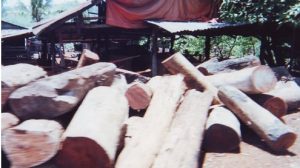
Jury Chai, Thu Rein : Township Peace and Development Council (TPDC) chairman in Three Pagodas Pass sub-Township, Karen State, have warned members of the area’s illegal logging industry to hide their goods from state authorities.
After receiving notice this month that state-level Burmese army authorities plan to travel to the area by the end of September, TPDC authorities ordered Village Peace and Development Council (VPDC) chairmen to inform producers, traders, and furniture sellers in their areas of jurisdiction to hide illegal logs and timber products before the final days of the month, or risk facing arrest by state authorities.
The TPP border-crossing between Thailand and Burma was closed in 2005; only timber countries inside Burma that possess valid export licenses are now technically allowed to sell timber abroad. Despite this, illegal exports of timber into Thailand continues to occur at TPP, largely thanks to what a local furniture seller called a “financial agreement” between the TPDC and members of the lumber industry.
Fearing repercussions if state-level Burmese authorities should see evidence of TPDC-sanctioned timber exportation, TPDC authorities have leaked news of the upcoming visit to the area’s illegal wood export industry, giving traders and sellers time to conceal their wares.
TPP lumber merchants explained that wood traders and furniture sellers in the area typically leave unfinished timber and logs sitting out in the open. Now that they have been warned of the Burmese authorities’ impending visit, members of the industry must find places to conceal stashes of contraband lumber.
A furniture seller told IMNA, “ yesterday they informed me to hide very quick the logs I have in front of the shop, but it very difficult to hide it all before the end of this month.”
Wood traders, who typically have larger quantities of unfinished logs and timber in their possession than furniture traders, are concerned about the costs of moving and transferring their goods.
“Yep, we have to hide [our lumber], but the furniture shop owners have it better than us [lumber traders], for us is it very difficult, because to move and transfer the all the wood is so hard, and also there are high expenses for transferring it, and we can’t pay for the costs,” a local wood merchant said.
This trader also reported that in TPP town alone is over a ton of newly harvested logs ready for export into Thailand; this estimate did not include planks and unfinished timber.
Traders in the town reported that they are technically supposed to sell their goods to the Burmese company Htay Co.Lt, which possesses a valid timber export license; traders reported that the company only buys timber at extremely low prices, making illegal exporting a more desirable option.
A TPP lumber producer reported that between the years of 1992 and 2004, timber exports at TPP were legal and very widespread. Following a state sanctioned clean-up of illegal timber exports between 2004 and 2005, and the closure of the border, the trade to Thailand has gone somewhat underground; this source reported that the Burmese state authorities know about the continued exports to Thailand, but have tolerated them as long as physical evidence of the illegal trade has not been viewed by authorities.
Incidentally, this producer reported that State Chairman U Win Khyu, who led the government crackdown on timber exports in 2004 and 2005, recently paid a visit to the TPP area for unrelated, and unspecified, reasons.

